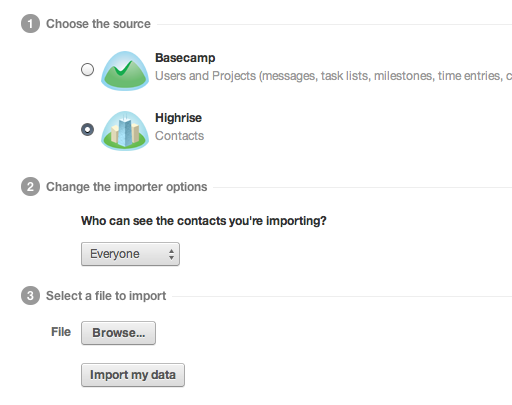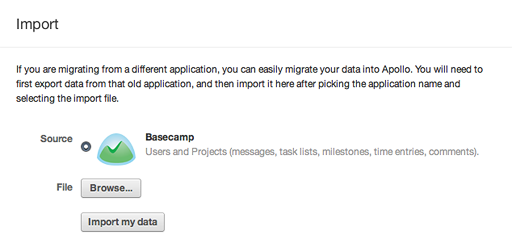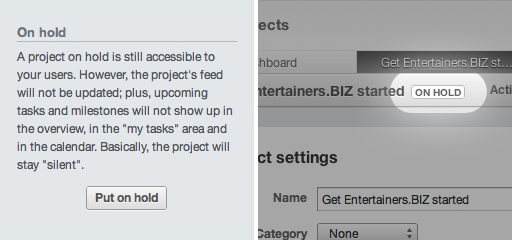Import your contacts from Highrise
Hi there,
Good news everyone! You can now import your Highrise contacts into your Apollo workspace:

Product updates, news & miscellanea from your fellow Apollo developers.
This blog has moved! Head to the Building Apollo blog »
Hi there,
Good news everyone! You can now import your Highrise contacts into your Apollo workspace:

Hi Friends! We introduced two features: a Basecamp-compatible data import, and a comprehensive data export for Apollo. These features are amongst the most-wanted ones, and have far-fetching implications.
Migrating to Apollo can be challenging: you might have several projects with valuable comments in a different project management system. This is why we worked really hard to write an import procedure that allows you to import your project from a Basecamp-compatible XML file:

This means that your projects, notes, milestones, etc. will appear on your Apollo workspace.
Hi friends! Apollo keeps improving. Some of the changes are minor, and yet important to many users.
Hi friends! When working on a large project, with several task lists, things could get a little complicated: people often wanted to hide task lists that would only be relevant much later in the project (they might belong to a milestone that is months away, for example!).
This is no longer the case: task lists can now be "hidden" by project administrators.
Hello friends! It's now possible, in Apollo, to place a project "on hold". A project on hold is still accessible to your users. However, the project's feed will not be updated; plus, upcoming tasks and milestones will not show up in the overview, in the "my tasks" area and in the calendar. Basically, the project will stay "silent".

Keep in mind that a project "on hold" is still considered active.
Hello friends!
With Apollo, you can attach files to messages and comments. This is a much needed feature: web designers often use messages and comments to show drafts; business people might share a contract draft or a business proposal; and so on.
After six months of being public (and six months of frenetic development, may I say), I think it's about time to talk about Apollo, its development, and how it's coming along.
It's very strange for me to think about the way Apollo was six months ago: we have been adding countless important features since we went live (cases & deals, group emails, etc.), and continue developing more and more important parts today.
Some people just seem to get a lot done: some of them might works two jobs, and yet has time for his family and -- yes -- for a social life -- never looking stressed in the meantime. Are they super-humans? No, they are simply people who know that it's not how much you work that counts, but how you do it.
The basic rules are very simple and yet seem so hard to apply:
The title of this blog entry is obviously sarcastic: we released Apollo at the end of July, and enjoyed talking to our early users. Since launching Apollo, we have received a lot of positive feedback, and... no negative comments. People told us about missing features they were missing, but that's been it: nobody ever said that Apollo was bad in any way. In fact, nobody said anything bad about it!
Then we decided that it was time to enter some software awards.
Imagine for a second that you just developed a piece of software that works online. Let's pick a random category: project management. In 2009-2010, you probably spent countless hours creating something very dynamic, with some 45000 lines of snappy Javascript. You then decide to make your application available to mobile devices. The question is: do you develop N native applications for N mobile platforms? Or do you develop one online application that works everywhere?